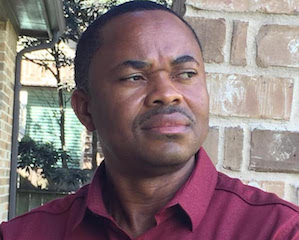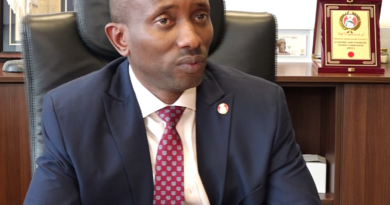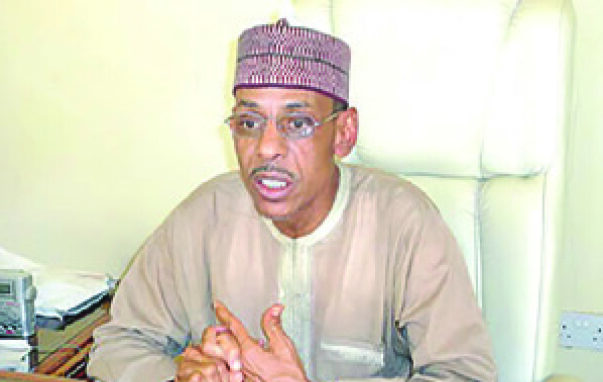On Okey Ndibe’s “Never look an American in the eye”-A reader’s review
By Osmund Agbo
There are some Nigerian writers whose work I regard as true masterpieces, but I can’t help feeling a bit intimidated by their style. Prof. Okey Ndibe is one of those writers. The granddaddy of this group, of course, is none other than the legendary Prof. Wole Soyinka. While writers like Chinua Achebe are known for limpid prose, these eggheads have a style that is characteristically turgid and impenetrable. Luckily, this particular book still managed to leave me with an ounce of my ego unbruised, for which I am eternally grateful.
The title of this memoir hit me like a ton of bricks. As a Nigerian-American parent raising a teenage son, I’ve always emphasized the importance of projecting strength in a cutthroat world. That means making eye contact and engaging confidently with everyone.“Never look an American in the eye” challenged everything I’ve instilled in him thus far. I couldn’t wait to delve into the pages and discover what it had to offer.
Starting out, Ndibe took us on a captivating journey through his childhood, which perfectly embodies the experiences of a typical Nigerian youngster raised in a middle-class home. As a young boy, he was enamored with displays of raw masculinity, and nothing embodied this better than the spectacle of American wrestling.
However, as he transitioned into adolescence, he became increasingly self-aware and sought to conform to the latest fashion trends together with his brother. His quest for identity and acceptance is one that resonates with anyone who has ever navigated the tumultuous waters of adolescence.
In this poignant memoir, Ndibe offers a refreshing perspective on the concept of family in African culture. Unlike the individualistic approach that is often emphasized in Western societies, Ndibe highlights the communal effort required to raise a child in an extended family.
From aunts to uncles, elders are expected to take an active role in shaping the child’s upbringing. They impart valuable life lessons and teach the child how to avoid potential dangers, as seen in Ndibe’s uncle’s warning to never make eye contact with an American. This touching portrayal of African family values challenges Western soceity’s notions of parenthood and reinforces the idea that it takes a village to raise a child.
The book is divided into short, episodic chapters, each of which offers a glimpse into a particular moment or experience in Ndibe’s life. One moment we find ourselves chuckling at his hilarious encounter with a sudden burst of cold wind on his arrival at the airport from Nigeria, his first-ever experience of snow in the United States. The next moment, we are moved to tears as we witness the painful discrimination he faced as a Nigerian immigrant in a foreign land.
Through his unique storytelling style, Ndibe brings his experiences to life, and we can’t help but feel like we are right there with him every step of the way. With each chapter, we gain a deeper understanding of his journey, his struggles, and his triumphs, leaving us feeling both inspired and fulfilled.
In the chapter “Lying to be a writer,” Ndibe shares a hilarious anecdote about one of his benefactors and a writer named John Edgar Wiseman, who mistakenly believed that he (Ndibe) was a budding novelist. Despite feeling uneasy about perpetuating the lie, Ndibe ultimately found that it provided the necessary motivation to pursue his dream of becoming an author.
This chapter struck a chord with me, as it highlights the challenges faced by aspiring writers, from self-doubt and procrastination to the daunting task of putting pen to paper. Ndibe’s advice to “lie about being a writer if you have to” may seem unorthodox, but it speaks to the importance of having the courage, grit, and stamina to see your dreams through to fruition. With perseverance and dedication, even a little white lie can be transformed into a powerful truth.
The book’s episodic structure, which offers a series of vignettes rather than a linear narrative, makes it easy to pick up and put down, while also allowing the reader to appreciate the full scope of Ndibe’s experiences.
Throughout the book, Ndibe’s writing is both engaging and insightful, as he reflects on his own identity as a Nigerian living in America, as well as the cultural stereotypes and prejudices that exist between these two countries. As a master strory teller, he was able to convey the sense of displacement and disorientation that many immigrants feel when they move to a new country, while also celebrating the resilience and adaptability of the human spirit.
This memoir is not only engaging but thought-provoking, offering a fresh perspective on the immigrant experience. Ndibe’s honest reflections and introspective writing will resonate with anyone who has ever felt like an outsider, and will leave readers with a deeper understanding of the complex and often messy process of cultural assimilation. In the process, it also highlights the urgent need for greater understanding and acceptance between cultures.
Authenticity, integrity, and emotional depth are the hallmarks of great memoirs, and Ndibe’s “Never Look an American in the Eye” has it all. With his unique blend of humor, vulnerability, and self-reflection, Ndibe’s storytelling style captivates the reader, leaving us with a rollercoaster of emotions.
Through his lived experiences, Ndibe takes us on a journey that is both deeply personal and universally relatable. His self-deprecating humor, in particular, creates an emotional connection with the reader, eliciting a range of responses from empathy to inspiration and even catharsis.
With every turn of the page, Ndibe’s compelling narrative draws us in, leaving us hungry for more. His honest and heartfelt approach to storytelling reminds us of the power of sharing our stories, of connecting with one another through the commonality of our human experience. “Never Look an American in the Eye” is a memoir that will stay with you long after you’ve turned the final page, inspiring you to reflect on your own life’s journey with a newfound sense of honesty and authenticity.
Osmund Agbo writes from Houston, Texas. Email: [email protected]




